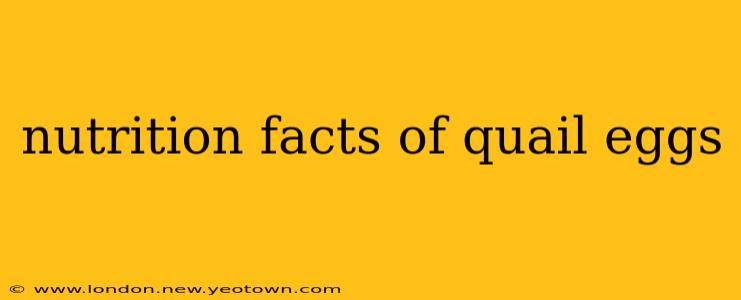The tiny quail egg, often overlooked in favor of its larger chicken counterpart, packs a surprising nutritional punch. For centuries, cultures around the world have recognized its culinary versatility and health benefits. But just how nutritious are these little wonders? Let's embark on a journey to uncover the nutritional facts and explore why quail eggs deserve a prominent place in your diet.
What are the Nutritional Benefits of Quail Eggs?
Quail eggs boast an impressive nutritional profile, surpassing chicken eggs in several key areas. They are a rich source of high-quality protein, essential for building and repairing tissues. But it's not just the protein content that shines; they're also brimming with essential vitamins and minerals crucial for overall health. Think of them as tiny powerhouses of nutrition! We'll explore the specifics in more detail throughout this post.
How Many Calories are in a Quail Egg?
A single quail egg typically contains around 15-20 calories. This low-calorie count makes them a guilt-free addition to various diets, including weight-management programs. Compare this to a large chicken egg, which can contain double the calories. This makes quail eggs a smart choice for those watching their calorie intake.
Are Quail Eggs Rich in Protein?
Absolutely! Quail eggs are an excellent source of high-quality protein, containing all nine essential amino acids our bodies cannot produce on their own. This makes them crucial for muscle growth, repair, and overall bodily function. In fact, gram for gram, they often contain more protein than chicken eggs.
What Vitamins and Minerals are Found in Quail Eggs?
The vitamin and mineral content of quail eggs is truly remarkable. They are a rich source of:
- Vitamin A: Essential for vision, immune function, and cell growth.
- Riboflavin (Vitamin B2): Plays a key role in energy metabolism and cell function.
- Vitamin B12: Crucial for nerve function, red blood cell formation, and DNA synthesis.
- Iron: Essential for carrying oxygen throughout the body.
- Phosphorus: Important for bone health and energy production.
- Selenium: A powerful antioxidant that protects cells from damage.
Are Quail Eggs Better Than Chicken Eggs?
The question of whether quail eggs are "better" than chicken eggs is complex. While quail eggs offer a higher concentration of certain vitamins and minerals per gram, chicken eggs provide a larger quantity overall due to their size. The "better" choice depends on individual dietary needs and preferences. Both are excellent sources of nutrition.
What are the potential health benefits of eating Quail eggs?
Beyond their impressive nutritional profile, some studies suggest potential health benefits associated with quail egg consumption. These benefits include improved immune function, enhanced cognitive function, and potential benefits for eye health, but further research is needed to confirm these claims definitively.
How to incorporate quail eggs into your diet?
The versatility of quail eggs makes them easy to integrate into your daily meals. You can boil them, poach them, fry them, or add them to salads, soups, or baked goods. Their smaller size also makes them perfect for snacks or appetizers. Get creative and experiment!
Conclusion: The Tiny Egg with a Giant Nutritional Impact
Quail eggs, though small in size, are giants in the world of nutrition. Their rich profile of vitamins, minerals, and high-quality protein makes them a valuable addition to any healthy diet. While they may not completely replace chicken eggs, incorporating them into your meals offers a delightful and nutritious way to boost your overall well-being. So, next time you're at the market, don't overlook these tiny nutritional powerhouses!

